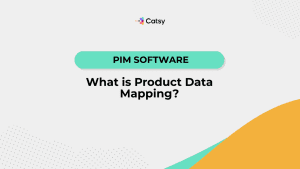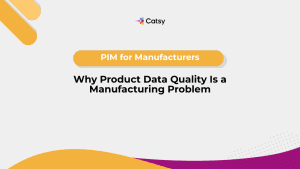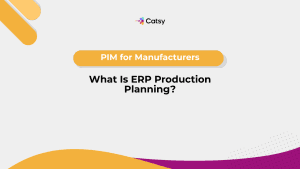Ecommerce vs. Marketplace: Key Differences Every Retailer Should Know
If you are an established brand that wants to try and digitalize your business, you are at the right place. The first thing you probably heard about was how you need to choose between ecommerce vs marketplace. The real question is which one of these two options your brand can use to its advantage more? This is a decision that a lot of brands and retailers who want to step from physical to the digital world come across. With so many different options, they want to make the right decision for their business.

What Is an Ecommerce Website?
An Ecommerce website is an online store where you showcase and sell your products. It’s your own little shop on the internet, where you are the one in charge. You get to choose how everything in your store looks. You have the ability to decide how customers find you, and you keep all the customer info close. Think of brands using Shopify or WooCommerce, they set up their own shops and sell just their stuff.
In this Article
What’s the best thing about an ecommerce store?
You’re the CEO. You control the branding, the vibe, and how people shop. Plus, you talk directly with your customer, no middleman. The thing with an ecommerce store is that you have to handle your own marketing and SEO so people can easily find that you are now going digital.
What Is an Online Marketplace?
The online marketplace can be described as a huge digital mall. That is a place where lots of different sellers come together to offer their products all in one place. The whole setup is provided by platforms like Amazon, eBay, or Etsy. They provide the website, payment system, and even some of the shipping logistics. Sellers just list their products and tap into the marketplace’s massive customer base.
The catch? You don’t get to control the look and feel of your storefront much, and the platform usually takes a cut of your sales. But the big upside is that you get access to tons of shoppers without having to build everything from scratch.
Pretty handy, right?
What’s cool about that?
You get access to a massive crowd right away, so your stuff has a better chance of being seen. It’s easier to get started since the platform handles payments, shipping setups, and even marketing to some extent. But, here’s the catch: you don’t really get to show off your unique brand vibe, and the platform keeps a lot of the customer info. Plus, those fees can add up.
Make Catsy DAM and PIM Software an Extension of Your Team
Book a Free DemoLet’s Break It Down, Head-to-Head
So, here’s the deal when you compare ecommerce websites and online marketplaces. With an ecommerce site, you own the whole thing, like your own little kingdom. You get full control over your brand’s look and feel, plus you get to chat directly with your customers and keep all their data. But, it usually takes more work to set up and you’re the one doing all the marketing. Fees are generally lower because you mostly pay for the platform itself.
On the flip side, marketplaces like Amazon or Etsy are owned by someone else, the platform runs the show. That means you have way less control over how your brand comes across, and the marketplace keeps most of the customer data. The setup? Super easy, since they handle the tech stuff and bring in tons of traffic for you. But the tradeoff is higher fees, you pay for listings and sales commissions, and you’re competing side-by-side with lots of other sellers.
What’s the Catch?
If you love full control and want to build your brand from the ground up, ecommerce is where you shine. But you’ve got to hustle on marketing and SEO to get noticed.
If you want to jump in fast, don’t want to fuss over tech stuff, or are testing new products, marketplaces are your best friend. Just watch out for competition and fees!
Trying to figure out whether to launch your own ecommerce site or dive into a marketplace ca. One of the first things to think about is where your business is at right now. If you’re just getting started, marketplaces can be a total game-changer. They’re super easy to join, don’t need a huge upfront investment, and you get access to a big crowd of shoppers right away.
Having your own ecommerce site is good for those who already built a bit of a name for themselves. Now you just want to grow a loyal customer base that really gets your brand and story. It’s like choosing between renting a booth at a busy market or opening your own little shop, both have perks, it just depends on your goals.
Next, consider your marketing resources. Do you have a team or skills to handle SEO, create content, and run social media? If not, marketplaces can give you a leg up since they bring in the traffic for you. On the other hand, ecommerce sites put you in the driver’s seat, you’re the one driving visitors to your store, which means you have more control but also more work.
Then there’s the type of products you’re selling. Got something unique, high-end, or custom-made? Ecommerce sites are great for showcasing those because you can really tell your brand’s story and add that personal touch. But if you’re selling popular, trending, or commodity items, stuff people search for by name or category, marketplaces can be a faster way to reach lots of buyers.
Finally, think about brand differentiation. When you run your own ecommerce site, you get to shape how customers experience your brand. The way you tell your story is all up to you. You can upsell related products and build lasting relationships. Marketplaces, however, tend to standardize listings. That might make it harder to stand out or get creative with how you present your products. It’s all depending on what matters most to you. If you value control, storytelling, or quick sales, your choice might lean one way or the other. What do you think fits your business best?
When Should You Pick Which?
So, when should you choose ecommerce or marketplace? Here’s what you should know.
Go with ecommerce if you want to be the captain of your own ship. Like, really steer the whole thing, how your brand looks, feels, and talks to people. If your story matters (and let’s be real, it probably does), and you want customers to feel that special vibe you’re putting out, having your own site is the way to go.
It’s a great fit if you’re in it for the long run. You know, building your audience little by little, testing out different marketing ideas, and really growing your brand in your own style. Those who are selling unique handmade items would probably find the most benefit in having their own store. It gives you the perfect space to show all of your products while still having creative control. It’s not just about making a sale, it’s about creating a whole brand and giving people a shopping experience they actually remember. Feels more personal that way, right?
Sounds kinda exciting, right?
On the other hand, go with a marketplace if you want to start selling yesterday, seriously, marketplaces let you jump in fast without much setup. If you’re experimenting with new products or testing out different markets, marketplaces make it easy to see what works without a big upfront cost. And if you want to reach tons of people quickly, these platforms already have massive audiences waiting to browse and buy. Plus, if you don’t have a big marketing team or just want to skip the heavy lifting of driving traffic yourself, marketplaces do a lot of that work for you, so you can focus on selling.
What do you think? Does one sound like the better fit for you right now?
Or Why Not Both?
Lots of brands actually rock a hybrid approach! They keep their coolest, most exclusive products on their own website where they can control the vibe and customer experience. Amazon or Etsy are their way of reaching a whole lot more people. With their popular or best-selling items, they get more traction. It’s like getting the best of both worlds!
After someone buys from the marketplace, these brands find great ways to bring those customers back to their own online store. Some of them use eye-catching packaging that encourages a visit to their site. Others utilize follow-up emails that offer special deals and updates. This way, they not only get new customers but also build a loyal fan base beyond just the marketplace traffic.
Can you imagine how powerful that is? You get a wide reach and instant audience from marketplaces, plus a deep brand connection and repeat business from your own ecommerce site. It’s a win-win!
Quick Peek: Amazon vs Shopify
Amazon is super quick to jump on. You can start selling almost right away because they’ve already got tons of shoppers coming to their site every day. So, you get that built-in traffic without much effort. But here’s the catch, you don’t really own the space. Amazon calls a lot of the shots, from how your products show up to the fees they charge, which can add up pretty fast.
On the flip side, Shopify is more like setting up your own little shop on the web. It takes a bit more time and effort to get everything just right, designing your site, figuring out marketing, and bringing in customers yourself. But the cool part? You have full control. You can customize your store however you want, build your brand vibe, and keep all the customer data. It’s your playground, and that freedom is huge if you’re thinking long-term.
So, Amazon’s great if you want to hit the ground running, and Shopify’s better if you want to build something truly yours. What do you think fits your style better?
What’s Coming Next?
Retailers are mixing it up with multichannel selling, websites, marketplaces, and social media shops all at once. Plus, AI is helping personalize shopping on ecommerce sites, which is tougher on marketplaces. And guess what? Marketplace is great but more brands want to build direct relationships with their customers.
Ready to pick your path or maybe try a little bit of both? Either way, knowing the pros and cons will totally help you make a smart move. And hey, if managing all your product info across sites sounds like a headache, tools like Catsy’s PIM and DAM can save your day.
Want more tips, tutorials, and insights on product content and e-commerce operations?
Stay connected. We post regularly to help brands like yours scale smarter.
Are You Ready To streamline your product content management?
Continue Reading

Frequently Asked Questions
Technically, no, you can sell exclusively on a marketplace. But having your own website gives you way more control over your brand and customer experience. Plus, if the marketplace ever changes its rules (and they will), your business won’t take a hit. Think of your website as your online home base.
It depends! If you’re going full custom with a web designer, yes, it can be pricey. But platforms like Shopify or Wix make it really easy (and affordable) to launch your own store without needing to code anything. You could be up and running for less than the cost of a night out.
Honestly? If marketing feels overwhelming right now, starting on a marketplace can take some pressure off. They already have traffic, you just show up. But if you want to build your brand long-term, it’s worth learning some simple marketing basics (like email and social media). It gets easier, promise!
Absolutely! Many sellers do this. You can list your bestsellers on Amazon or Etsy to get exposure and direct customers to your website for exclusive items or bundles. Just be sure your pricing and shipping info stay consistent across both.
It takes time and effort, but it’s totally doable! Focus on content (like blogs or tutorials), social media, email lists, and maybe a few ads. You don’t need to do everything at once, just start small and stay consistent. The goal is to build a community, not just make sales.
That’s actually a good thing, it means your brand is growing! When you’re ready, you can shift your focus to your ecommerce site, where you keep more profit and control the full experience. Many successful brands started on Etsy or Amazon and eventually moved most of their business to their own site.
Not at all! Especially in the beginning, marketplaces are a great way to validate your products and build momentum. But relying only on them long-term can be risky since they can change policies, raise fees, or even suspend your account. Having your own site is like having a safety net.
Subscribe For More Content
Sign up for monthly tips on how to drive revenue with product content.




